|
Portraits of later days
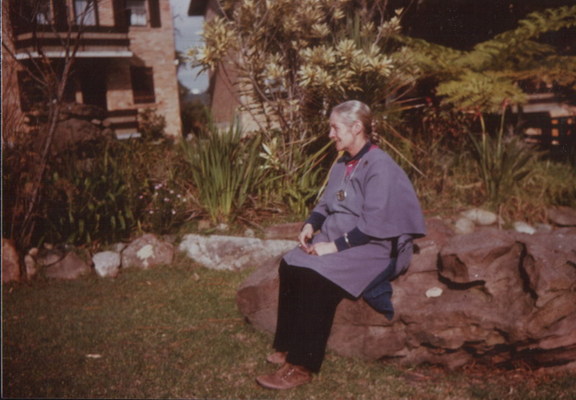 Mechthild in the garden of the retirement village at
Allambie Heights in 1986
Mechthild in the garden of the retirement village at
Allambie Heights in 1986
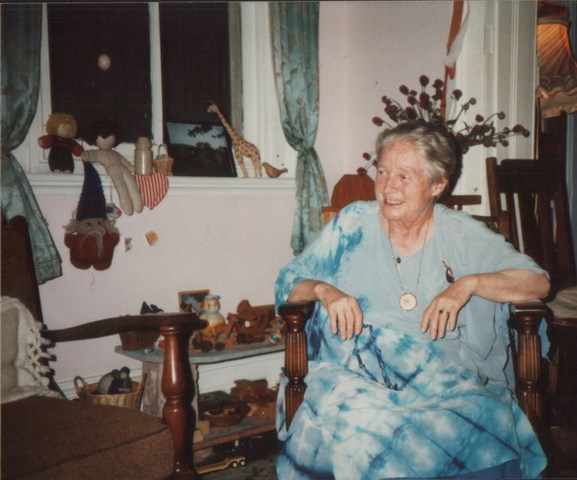 At the hostel in Glebe, later in 1986.
Mechthild's last place of residence.
At the hostel in Glebe, later in 1986.
Mechthild's last place of residence.
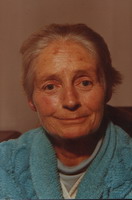 The following series of photographs was taken just
prior to Mechthild's death in July 1987
The following series of photographs was taken just
prior to Mechthild's death in July 1987
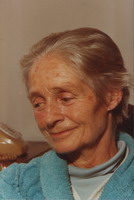 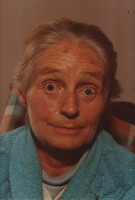 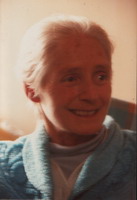 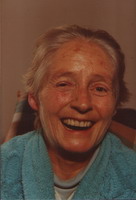 This article appeared in the
Journal of the Anthroposophical Society of Australia, Vol. 7,
No. 4, August 1986
This article appeared in the
Journal of the Anthroposophical Society of Australia, Vol. 7,
No. 4, August 1986
Mechthild Harkness (20.3.20 -
25.7.86)
In the morning hours of the 25th July, shortly
before the sun fought its battle with the stormy cold conditions
of the most wintry weather since the turn of this century,
Mechthild Harkness crossed the threshold from this sense world
at 9.15 a.m. A dramatic elemental act was accompanying her exit,
and at moments during the day, friends observed some peaceful
rays of sun filtering through the grey turmoil of clouds,
opening the curtains for her entry into the new world.
The
Life of Mechthild Harkness
In whatever part Mechthild acted
one experienced that she had full command of all her artistic
faculties. She could leave herself as a person behind, and unite
so much as an actor with the substance of the word and content,
with gesture and voice, that the elemental world would be
present. In her last hours she lay peacefully whilst the drama
now was being performed by the elements themselves in her
environment.
Mechthild lived her life's path true to her
own personality. She stayed independent, defiant for her cause,
strong and upright in the face of work and denying her ailing
body up to death.
Mechthild embodied speech and drama, and in
her last hour, already unable to verbally reply any longer, when
she was told how much her friends loved her work, that they were
grateful for what she has given, and that her work will live on,
she spoke with a radiant smile, already permeated by her
spirit-self.
Mechthild did not stand for ceremonies: she went
straight to the point of her work with her remarkable individual
determination, even to the end. She left instructions that she
would not want a funeral service, nor any religious ceremony.
Only Mechthild could do such a thing in style, since she had
filled her friends with strength, with substance of the Word, so
that they could be with her in spirit and yet could leave her
free to do what eventually everyone must learn to do, to cross
the threshold alone. Alone, and yet in company: that was the
essence of Mechthild's life.
Mechthild, who was born in
Dornach, and named by Rudolf Steiner (her name means 'Mighty
Maiden'), gave the short account of her life which was
published in October 1981 in this Journal, from which the
following excerpt is taken:
Mechthild was surrounded by
artistic activity from her earliest years, participating in
performances even as a very young child. Her mother, Lucy
Neuscheller, was one of the very early Eurythmists under Rudolf
Steiner and brought the art of Eurythmy to the U.S.A. In her
youth Mechthild attended a number of drama schools and trained
in Opera. The family returned to Dornach for a few years where
Mechthild first met Alice Crowther who was then doing her speech
training with Erna Grund and her Eurythmy training with Friedel
Thomas. Back in New York, Mechthild trained in Eurythmy and met
her Australian husband, Alan Harkness, who was then working with
the Chekhov Theatre Studio. When the Chekhov Studio disbanded,
Alan went to California where Mechthild joined him. In 1949-51
she and Alan toured Europe and America with their duo
performance of Great Moments from Shakespeare and spent time
studying with Erna Grund in Dornach. They returned to America
where Alan was tragically killed in 1952. In 1954 Mechthild
returned to Dornach and received her Diploma in formative
speech, graduating in the same year as Virginia Brett. She
remained in Dornach for the next twelve years, teaching,
performing and producing. In 1967 Francis Edmunds asked her to
set up a Speech and Drama Department at Emerson College where
she worked for the two years prior to her arrival in
Australia.
In July 1969, the first classes commenced in
Sydney with Mechthild teaching Speech, Eurythmy, Greek
Gymnastics, Improvisation and Drama. Marj Waugh, who had been
carrying the Eurythmy work after her many years with Alice
Crowther, and Doug Waugh, connected with the early drama work of
Lute Drummond, came along to give their blessing. A much
appreciated and continuing support has come from an early
student, Garry Richardson.
In particular, the late Dennis
Glenny, who left us two years ago, close to the same July date
as Mechthild's passing, was deeply committed to supporting
and furthering her work.
So she began her work in Australia
with the powers of independence, inwardly centred on the work of
speech and drama. Outwardly restless in her destiny, which took
her 24 times across the Atlantic from Dornach to the States and
back, and also here in Australia, she moved her studio at
various times from one place to another, every time starting
anew. But wherever she worked she left her imprint.
In the
Studio in Sydney she attracted students from all over the world.
Young enthusiasts came from Israel, England, South Africa,
America, and from Dornach, to study with Mechthild. Her speech
formation was so outstanding that her work became the centre for
the English speaking speech impulse. She was authorised to give
the successful pupil a 'Goetheanum' diploma on behalf of
the section for the Arts. Every year a new group of students
would join her course, and when her pupils and friends gathered
three days after her death to share memories, they all sat
together around a large circle of two rows. There were many
friends, and yet these were only those who had worked with her
during the last years and thus we needed to imagine on that
occasion many, many more such circles of friends around
Mechthild, the friends of the early times of Lorien-Novalis
School, the friends of the formative youth movement of 1970 in
the Anthroposophical Society, the friends of Emerson College,
and of the thirteen years at the Goetheanum and then in the
United States and, last but not least, those of her early
childhood, her sister and her husband, the early
Anthroposophists, closing the circle from the beginning of her
earthly path to her last act on this southern continent
Australia, which she so dearly loved and into which she spoke so
strongly with her powerful spirit and the true formative
word.
Her work will live on, and we shall be conscious of her
in the coming Summer Conference, which will be on the theme of
The Renewal of the Word, so that she will further her intentions
in the word, so that she can bring further nourishment to speech
formation.
Karl Kaltenbach
Stars once spoke to
men,
their growing silent is world destiny.
Awareness of
this silence can be pain
for earthly man.
Yet in the
muted silence
there now ripens
what men speak to the
stars:
Awareness of this speaking
can become
strength
for Spirit-Man.
Rudolf
Steiner
In
|
|